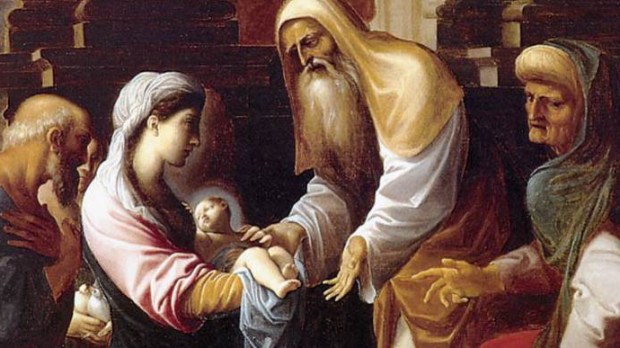At first glance, the mystery of Jesus’ presentation at the Temple seems a largely joyful one. It’s the Fourth Joyful Mystery, after all, in which his glowing mother takes him to church for something like a baptism. We picture Mary buying a sheet cake at Costco before the big day and smiling to herself as Simeon and Anna coo over her chubby cherub.
But there is nothing in the life of Christ that doesn’t cast a Cross-shaped shadow, and a moment with the footnotes of this particular reading makes it clear that this is more than just a rite of passage. When Jesus was eight days old, Luke tells us, he was circumcised. When he was 40 days old, his parents went to the temple to make an offering of two turtle-doves, the sacrifice made by the poor for purification after childbirth.
What Luke doesn’t mention is an offering of five shekels to ransom Jesus, the first-born son. This exchange goes back to the time of the Exodus, when God called the Israelites to consecrate all firstborn sons to him (Exodus 13:2). Later, when the Levites were chosen to serve in the temple and to be priests of the Most High, God commanded the people to ransom each consecrated firstborn son from priestly service by making an offering of five shekels when the child was one month old (Numbers 18:16).
The reason, it seems, that Joseph and Mary did not fulfill this element of the law is that Jesus was not to be ransomed. Instead he was to remain consecrated as a priest of God, offered in sacrifice. Though Jesus was already in a covenant relationship with the Father, he was still circumcised, in order to be faithful to the Law. Though Mary had no sin, she made a sin offering, in order to be faithful to the Law. Here, though, Joseph and Mary were faithful to the Law not in offering the prescribed ransom but in offering their Son instead.
When Luke tells us that Jesus was presented at the Temple, the word he uses is the same that is used of sacrifices. Mary and Joseph brought their baby that day to offer him as a sacrifice, to offer him back to the Father. Mary was once again giving her fiat, once again consenting to the agony of Good Friday. She was bringing the Lamb of God to the temple.
For years, all I saw in Mary’s heart that day was pain. She held in her arms the object of all her longings, the desired of all nations, and after only 40 days God was demanding him back. Oh, he would be hers for another 30 years, but not entirely. Already he had been promised to the Father. Already she knew she would lose him. And as I meditated on this mystery, all I could do was ask for the grace to surrender my deepest desires to the Father, to let him take away all I wanted and trust him in that pain.
But Mary was never one to grasp and cling, the way Eve and I do, the way all of us do. The Father has to pry open the fingers I clench around my plans or blessings or addictions, his gentle touch causing me pain because of my refusal to trust him, but Mary held everything with open hands. Whatever she received, she delighted in offering back to the Father.
When Mary brought her infant Lamb to the Temple, she rejoiced to offer him to the Father. She delighted in Simeon’s prayer, “Lord, I can die happy. This is all I ever wanted.” Even his prophecy of the pain she would suffer sparked no bitterness or resentment; when the Immaculate Mother of God told the Father to do what he liked in her life, she held nothing back. At the Presentation, she affirmed once again her prayer from the Annunciation: “Let it be done to me according to your word.”
This is what the Lord asks of us at every Mass. When the bread and wine are offered to the Father, he invites us to place our lives on the altar, our joys and our suffering. He asks us to take all that we have and all that we are and offer it to God, as Jesus did on the Cross, as Mary did at the temple. The remarkable thing is that when we do this, we often find our offerings transformed and handed back to us, but even when his mercy is more severe than tender, we rejoice because we know him to be a good Father.
On February 2, the Church celebrates the Feast of the Presentation. Together with the Blessed Mother, let’s offer our lives to the Lord, trusting that he will consecrate them for his glory. And having given him permission to be Lord of our lives, let’s rejoice. Come what may, we are his, and there’s nothing more we could ask.

Read more:
Considering Mary’s nightmares

